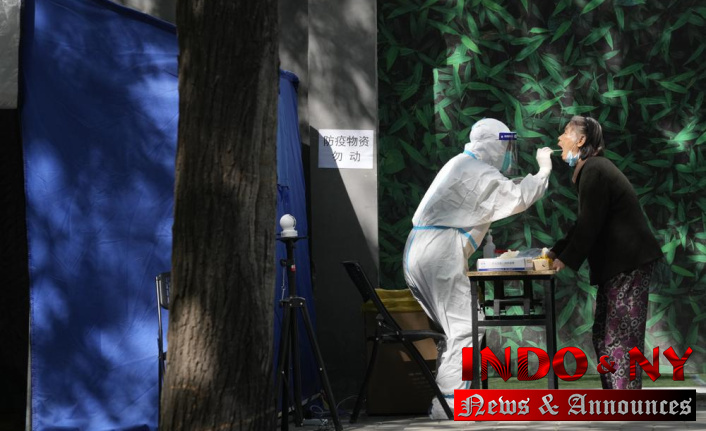BEIJING (AP), Beijing has begun to build new hospitals in order to handle a potential spike in COVID-19-related cases. However, the number of new cases is still low.
According to state media, Tuesday's report said that a 1,000-bed hospital in Xiaotangshan, northeastern suburbs, built for the 2003 SARS epidemic, has been renovated in case it is needed.
Officials from the city announced on Saturday that they would be setting up a 10,000-bed quarantine unit in the sprawling China National Exhibition Center for those who have been positive or their close friends.
Officials have not said anything about these plans, and reports of them having disappeared largely, which could indicate that they are trying to reduce fears in a already fragile city.
The number of new cases in Beijing has remained steady with another 62 being reported on Tuesday. Of those, 11 showed no symptoms. This is a slight increase from the 50 that were reported over the weekend. In the two-week-old outbreak, Beijing has reported approximately 450 cases.
China has remained true to its "zero COVID" policy. This restricts travel and tests entire cities. It also sets up large facilities to isolate infected people. If the virus spreads, lockdowns will be extended to include entire neighborhoods and buildings.
Beijing may have isolated some communities but resisted the city-wide policies seen elsewhere.
This could be a reflection of the desire for calm in the city, which more than anything represents the Communist Party's unopposed control over the country. This urge is particularly important in a year where President Xi Jinping seeks a third five-year term of party leader despite concerns over single-man rule.
Xi has been very clear about himself and his party's affiliation with "zero COVID." This makes it politically impossible for the party to abandon this approach. Experts question the usefulness of the approach and other countries have relaxed their pandemic restrictions.
Beijing has ordered all restaurants and gyms to close for the May Day national holiday. The May Day holiday runs through Wednesday. Major tourist attractions in Beijing, such as the Forbidden city and the Beijing Zoo will also be closed starting Tuesday. Senior students are preparing for important exams, so schools will remain closed indefinitely.
After a similar request last week, three more rounds of testing were ordered for the majority of the city's 21,000,000 inhabitants. They will begin Tuesday. To gain access to most public spaces, you must have a negative result from within the last 48 hours.
Authorities in Shanghai are gradually easing the lockdown restrictions that had kept most of Shanghai's 26 million residents in their immediate neighborhoods, apartments, or housing compounds for nearly a month. In some cases, it took even longer.
On Tuesday, Shanghai reported an additional 5,669 cases, with only 274 of them asymptomatic. There were also 20 additional deaths. China's biggest city and home to its largest stock exchange and most important port recorded a daily peak in cases of 27,605 nearly three weeks ago, on April 13.
The surprisingly low death rate in Shanghai, despite an epidemic of over 400,000 cases, has raised questions about the accounting for such deaths.
Massive disruptions have resulted in food shortages, as well as a larger, but likely temporary, impact on national economies. Outraged, desperate citizens confronted the authorities at barricades or online and screamed from their windows, banging pots and pans as a sign they were frustrated and angry.
A video of funeral parlor workers returning a bag with a living person to a retirement home was circulated online in a move that could lower public confidence in the public service sector.
The incident was confirmed by the Shanghai district government, which said that five officials were punished and the license for a doctor was revoked.
Two funeral parlor workers were wearing full protective suits when they pulled a yellow body bag from a hearse. The two workers opened the bag to show a Xinchangzheng Nursing Home worker that the deceased was still alive. The person was quickly returned to the home.
This incident caused outrage on Chinese social media with many questioning the reliability and legitimacy of the social welfare system in China during prolonged lockdown.
The Putuo government, where the nursing home is situated, stated Monday in a statement that the subject of the video was receiving treatment at a hospital and had stable vital signs.











